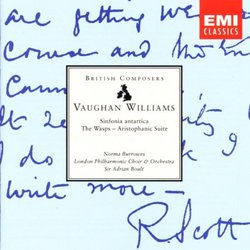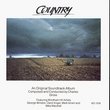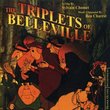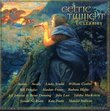| All Artists: Ralph Vaughan Williams, John Alldis, Adrian Boult, London Philharmonic Chorus, London Philharmonic Orchestra, Norma Burrowes Title: Vaughan Williams: Sinfonia Antartica/The Wasps Members Wishing: 0 Total Copies: 0 Label: EMI Classics Release Date: 10/11/1991 Genre: Classical Styles: Historical Periods, Modern, 20th, & 21st Century, Symphonies Number of Discs: 1 SwapaCD Credits: 1 UPCs: 077776402024, 077776402055 |
Search - Ralph Vaughan Williams, John Alldis, Adrian Boult :: Vaughan Williams: Sinfonia Antartica/The Wasps
 | Ralph Vaughan Williams, John Alldis, Adrian Boult Vaughan Williams: Sinfonia Antartica/The Wasps Genre: Classical
|
Larger Image |
CD DetailsSimilarly Requested CDs
|
CD ReviewsI've been very impressed Trevor Gillespie | San Jose, California United States | 02/03/2000 (5 out of 5 stars) "Ordered this CD from Amazon.com and was not familiar with the recording or the conductor. A friend recommended this particular recording after we had listened to the work. The sound is great. I am amazed that the sound is almost as good as a digital recording of today. The performance is wonderful. It is apparent in the first movement that Boult truly had the vision of the picture VW was trying to create with his Antarctic Symphony. Listen to the prominent trombones. They're awesome! The mystery, fear, wonder, cold, and intrigue of the Antarctic all seam to be there. Also the liner notes are excellent for deciphering the instruments used to depict various things. On top of all that, this CD isn't full price. My understanding is that this is the best recording of this piece. I would not disagree." Symphony of the South Pole jean couture | Quebec city - Canada | 04/04/2002 (4 out of 5 stars) "THIS SYMPHONY is, definitely, one of the most important works of the 20th century. It's a heavy piece of music, not really of the quiet listening sort. Most readers will undoubtedly agree that the heart of this symphony is the Landscape movement with it's window-shattering organ passage. As a reviewer for Good-Music-Guide so promptly remarked : "The Sinfonia Antartica is a wonderful piece of music and those who dismiss it as `mere film music' are forgetting the genius of Vaughan Williams. [...] I love the novel, exotic sounds and techniques Vaughan Williams created to describe the Antarctic landscape ; you are practically transported there! It is a work of incredible musical imagination. The use of wordless soprano and chorus, the wind machine, the use of block organ chords to symbolize the glacier; they are master strokes." I couldn't agree more. There are many elements that contrive to make this fine symphonic oeuvre a master's work. The thematic concept foreshadows the resurgence of spirit previously seen and heard in the film 'Scott of the Antarctic' and its music. Therefore, the symphony has much of a motion picture, "soundtrack-like" temperament ; still, the symphonic form stands as the core of this huge work. There is no denying of the composer's mastery of form and harmonic coloring for, as orchestral parts should go, this symphony is every bit as much efficient as his best film scores. Interpretation can do the difference, however, with more or less of a "straight" symphonic approach or within the confines of a "cinemascopic treatment"--variable from one conductor/orchestra to another. Which is exactly why one can guess, even without knowing the roots of the symphony in the first place, that it all was strongly built on music for a motion picture. Some of the recorded versions seem to provide more of that effect, the earlier accounts of the 1950's in particular. There are many good examples on disc of the Sinfonia Antartica, the 7th symphony conceived by Ralph [pronounced `Rayfe'] Vaughan Williams (1872-1958). A few ones, to be fully honest, sound more like "pretty good attempts" rather than truly consummated deeds. I'll try to describe what you are likely to find. Bernard Haitink (with the London Philharmonic, on EMI) brings out what one hears as, perhaps, the greatest modern recording : That's powerful stuff. The majesty of the work is captured at it's fullest--with subtleties and colors--and with unrestrained intensity and drama. The recording features the attractive soprano voice of Sheila Armstrong and a reliable choir backed by inspiring orchestral parts. The glacial mood is caught perfectly ; the apparently bleak music unveils a small extent of appropriate wildness--interestingly, not unlike what one often hears from Sibelius. But comparisons with the great Finn stop here, for the contexts are much different (in an attempt to detect some musical affinities with Sibelius, it might seem more to the point to look at Vaughan Williams' Third, Fifth and Sixth symphonies, as their sometimes "cold" nature or somewhat stark attitude -versus warmth and expressive humanity- could justify comparisons). In most of his nine symphonies, Vaughan Williams sums up, for me, the best of both worlds between Jean Sibelius' `inner logic' or `pure spring water' and Gustav Mahler's obstinate assertion that `the symphony must be like the world' and `must embrace everything'. Like Holst's Planets or Dvorak's New World, the Sinfonia Antartica--like many other symphonies--is certainly universal and "embraces everything" while dealing as well in some individual ways with formal logic and thematic growth. If Haitink's version is, on various points, memorable, then that is not the only great recording of the work. Actually, it's been claimed that the version directed by Raymond Leppard might be a serious challenge to the former (Indianapolis, Koss Classics CD 2214). Indeed, a fantastic reading it is--with splendid recorded sound. The album has earned several positive reviews and, not the least of it, was one of Stereophile magazine's 'Records To Die For' in 1994. Leppard's meticulous and yet at times brawny approach opens up the fittingly atmospheric gelid wind guts of the first movements. One way or another, the huge dynamic range of this disc helps. The Landscape movement really is power music! Andre Previn (RCA) succeeds definitely on this one, thanks to a strong, bold and obviously solid orchestral playing by the then-members of the LSO. The crucial Intermezzo (fourth movement) is stunning and retains a "thin edge" of romantic attitude contributing to the uniqueness of that windswept polar symphony. I find the fourth movement especially fascinating because it is oddly tenebrous and illuminated at once ; of the five movements this one is certainly the most "pastoral". The mood calls for some yearning for home and evokes pleasant memories. But then comes a passage considerably more somber in character--if not squarely lugubrious, perhaps to remind us the frightening feeling of abdication in the middle of that immense no man's land--leading inexorably toward the end of the movement. I draw a parallel with Holst and his Planets (the big tune in 'Jupiter') where, for a moment, we come back "at home" through a longing, thoughtful, if not dignified, melody not completely bereft of jovial rejoicement--as if only to stir a few good familiar memories. In the big Sea Symphony of 1910 there is a similar space/time trick, but i won't say where it is precisely located in the score for the musical enjoyment of those who don't know. Regarding the Antartica, only Boult with LPO (EMI recording of the present discussion) surpasses Previn in that movement : Handley also excels here, but not as much as Boult or Previn. Other highlights of the Previn are a solidly anchored Scherzo (not as firm and steel-cast rigid as Haitink's, though), a very decent Prelude and a climactic Landscape--the latter at its apogee in Haitink's reading in terms of verve and presence. It does sound really good, too, as led by other conductors but its probe seems quite a bit more convincing under Haitink. Adrian Boult's performance (EMI) is, without an ounce of a doubt, a very good account. Sound is tight and emphatic, but at the same time it seems to lose track of bits and pieces in minute orchestral details ; nonetheless, this is a dynamic reading of the score and the organ part is a smasher. Boult's reading of the Epilogue (fifth movement) is heartfelt and, though it retains a thin edge of reserve, he still conveys with some sense of yearning the drama which brings such a titanic piece to a close. Nice work, as well, by the chorus and wordless voice. They express well their parts which most people will undoubtedly identify with the ghostly voices heard in Holst's `Neptune'. The dark, inhuman atmosphere is also well-rendered (it is comparable to the readings from Haitink, Previn and Slatkin on that point). Not necessarily viewed as Boult's greatest achievement on disc (some people say that feat could pertain to his justly famous Moeran on the Lyrita label), it still deserves to be ranked as an honest interpretation. And, as i said earlier, there's the nice fourth movement which, under Boult's direction, is absolutely ravishing. Boult's original efforts (December 1953, issued by Decca Records), were described as a classic reading, usually hailed by connoisseurs as a superior account in comparison to the EMI under review. Of course, the stereo EMI has a clear advantage with fuller and richer sound, but i still think it lacks the "drive" of the earlier version--distinctly dark, more "impactful" and decidedly tauter as a reading. Leonard Norwitz, a music reviewer, noted that "the Sinfonia Antartica [...] ranks as one of the great tone poems for orchestra, filled with appropriate awe for one of the most hostile, striking and beautiful places on our planet. The younger Boult finds darkness within the ice landscapes, blinding light in the ravines; respect, hope and fear in our future. The EMI doesn't bring us quite to the abyss." I marginally prefer the mono Decca - which sound isn't that bad, after all, if only not as much detailed. One could even argue--and rightly so--that most of the dynamics on the EMI are present on the monophonic Decca. The 1953 LPO recording (Kingsway Hall) has aged well ; most important, the music is infused with surefire power and drama. The atmosphere is icy and threatening. Throughout, there is a strange sense of "the real thing" as we proceed on this polar journey. Margaret Ritchie had a fine voice and was a perfectly suited soloist for that program, perhaps even more so than Sheila Armstrong, Norma Burrowes or Heather Harper. Ritchie is also the voice you hear in Sir John Barbirolli's Antartica, with the Halle Orchestra, the first recording--and still probably the greatest--of the work. The EMI-Boult CD pairs the symphony with a persuasive recording of 'The Wasps' (the whole Suite, not just the Overture). 'The Wasps' belongs to the more typical VW : Orchestral music a la English Folk Song Suite, etc., certainly a lighter fare than the fate-laden symphony. Here we have a really good, competent recording of that entertaining Suite ; "Classic Boult," i'd say. Yet, if you prefer two symphonies on one disc then perhaps you should look elsewhere, such as Previn's, the earlier Boult on Decca or the more recent Kees Bakels on Naxos (all generous couplings with the Eighth Symphony). As regards quality, the spacious EMI studio recording is no less than excellent. Other versions of the Antartica? Well, of course there are and there's a bunch of them worth the term "recommendable". Kees Bakels with Bournemouth S.O. (a justly famous Naxos disc) does a fine job in both symphonies 7 & 8. Here we have a definite best-buy, with solid performances and impressive sound. In the Landscape the organ part is simply awesome. I can't outline similitudes between Bakels and others, but i do really like his confident approach and the adeptness of his musicians. This is a vivid and audacious CD with a superb account of the Antartica and graced by one of the top recordings of the picturesque Eighth Symphony. As the most successful issue from the Naxos cycle, it is easy to understand why most of the critics were favorable about that one. Leonard Slatkin with the Philharmonia Orchestra (RCA CD, now deleted) offers another pretty good alternative : His rendition is quite fine and the rather dark mood matches well the occasionally reckless orchestration which conjures up the drama of an expedition striving to survive (and, ultimately, lost against the implacable forces of nature). Slatkin could make it at the top of your own list of best Antarticas. Personally i stick with Haitink, Previn, Boult (EMI) and Thomson (Chandos) as the crowning stereo versions, not omitting the numerous merits of Bakels and the powerful traversal from Leppard. Vernon Handley's interpretation (with RLPO, on EMI) is certainly impressive if not quite entirely exceptional : There's a prominent sense of atmosphere, beautiful tonal effects bolstered by the brass and the strings, huge dynamic range. Despite a few blemishes, that's a credible reading. The wordless soprano sections are good and the chorus is more than adequate (Handley's recordings did not always get the best in respect to vocal performance that seemed, at times, a little unhurried). The strength of his reading is primarily orchestral, where it is directed with an effective grip. You can't go wrong on this one. The quintessential mono recording from Sir John Barbirolli has been reissued in Europe by EMI (British Composers, CMS 5 66543 2) and is excellent in every way. Rob Barnett of MusicWeb notes that "this version must therefore be regarded as another historic document. It sounds quite clean; its impact is not garish. Woodwinds are emphasized by the balance. Barbirolli really pitches in with a gruff fast sea-swell of a tempo at the opening of the finale". Sir John's Antartica was recorded in June 1953, in presence of the composer, not long after the first performance by the Halle Orchestra--thus a "definitive" or "authoritative" approval of some sort is perfectly relevant. Barbirolli is a lot more in the vein of Boult in his mono Decca recording of the same year, similarly dark but with somewhat more of his characteristic rubato ; unlike Boult, who perhaps is a little more "Cartesian", Barbirolli unleashes the emotional side of the symphony. His forthright mastery compensates for the sporadically undisciplined brass playing of the Halle (although Boult met sometimes the same kind of issue with the 1950's era LPO). I mentioned the word emotion, in respect to Barbirolli. That doesn't mean Adrian Boult's majestic reading is completely deprived of feeling or of a sense of endeavor in any way. However, Sir John's seems a bit more inclined to a certain surge of excitement all along whereas Boult keeps a tight rein more steadily over the course. To be very simplistic (perhaps too much so) i'd be tempted to say that Boult is proficient whilst Barbirolli is impassioned. The differences between the two of them aren't enormous : There are more discrepancies between their interpretations and Previn's, for instance. Bryden Thomson's reading with LSO on Chandos (CHAN 8796) is yet another very good example of finely shaped, well-structured realization of the score. Here we have a concentrated performance. The chorus and orchestra have made a very nice job, and so is soprano Catherine Bott. On CD it was paired with a most splendid version of Toward the Unknown Region. It has a beautiful sound, "trade mark" Chandos. I'll refer to the forum in Gramophone (credit: Paul Best): "The London Chorus is outstanding to spectacular, the soprano Catherine Bott is exceptional at grasping the imagery and, thus, draws you in with her captivating range of vocals". Although the latter boasts several of the common qualities of the best recordings, it cannot reach the stature attained by, say, Haitink, Previn or Boult in their equally superb stereo versions. Still, Thomson and the LSO did a myriad engrossing things with the score. In all, this is a lovely reading which i should honestly recommend vis-a-vis its own attributes. Albeit a little bit homogenized, not enough audacious perhaps, the version by Andrew Davis and the BBC S. O. remains pretty much appropriate and "in the mood" (it isn't what you'd call top notch rendition, though). That is said with regret because it received some truly great recorded sound (some might prefer their heroic reading of the Sixth Symphony, one of the finest on disc, or a crystalline and healthy recording of A London Symphony--more preferable to the Antartica from their apparently variable Warner/Teldec cycle). Too bad we don't have a commercial recording by Richard Hickox for most of his recorded legacy is engaging and he's always been true to the composers he played and to the idiom of a characteristic "English voice." To sum up : On disc you might find most of them (i suggest you check out the OOP market, btw). The choice is yours. You might want to avoid the narrative between movements, so you'd have to buy consequently (Boult I, Previn and Leppard insert narratives between movements--most notably Boult I with the great Sir John Gielgud which i think is quite inspiring). On the plus side, Previn's includes a very decent reading of VW's Eighth Symphony (as does the bargain-priced Naxos). Boult's version on EMI is arguably very good, and is nothing short of outstanding in the two last movements. The 1960's sonics excel. And, yes, John Barbirolli's classic recording still reigns supreme... No matter what particular version YOU prefer, in the end i wish you all a musically satisfying listening!****" Feel the cold pain Santiago Barcon | Mexico city | 11/02/2000 (5 out of 5 stars) "The Antartica symphony was written to remember the expedition that died in the Antartica. You can hear the winds and the "silence" sound.This record is the best performance available and incredible. Sir Adrian Boult feels the pain of his countrymen and the orchestra too. For englishmen this was one of the sadest happenings of the 20th centuryI bought this record after hearing it live in Mexico city, that was a great performance. I had a previous CD on the complete Leonard Slatkin Vaughan Williams symphonies, but I like this one a lot more.Highly recommended."
|

 Track Listings (10) - Disc #1
Track Listings (10) - Disc #1







![24 [Original Television Soundtrack]](https://nationalbookswap.com/cd//m/42/1942/721942.jpg)
